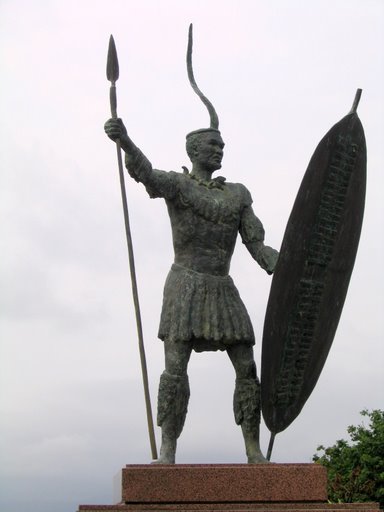
Shaka, named after the iShaka intestal parasite, was born around 1787 CE as the son of Senzangakhona, king of the Abaguni.
At first Senzangakhona wanted to kill him, but Shaka'a mother Nandi turned his mind around and convinced him to marry her, so that Shaka's birth was legitimized.
After a couple of years the king changed his mind again, prompting mother and son to flee.
First they went to Nandi's tribe, the eLangeni and later, around 1802 CE, found protection with the mTetwa tribe under Dingiswayo Kajobe.
While staying at the Zulu, the eLangeni and the mTetwa, Shaka was viewed as a bastard and an outsider, and was frequently bullied.
In response he grew fierce, revengeful, ambitious and ruthless.
When he was 23 years old, he was taken into the mTetwa army.
There he gained fame as a warrior, showing great courage and pushing the military innovations of his mentor further.
In 1816 CE Senzangakhona died.
Shaka's half-brother Sigujana succeeded, but Shaka displaced him in a swift coup, with support of the mTetwa.
He remained a subordinate of Dingiswayo and fought with the latter in his wars.
A year later Dingiswayo was killed by his rival Zwide KaLanga of the Ndwandwe clan.
Shaka remained allied with the mTetwa tribe, increasingly as the senior partner.
During his service under Dingiswayo, Shaka had equipped and trained his "iziCwe" (bushmen) regiment
with a stabbing spear, rather than javelins.
He had trained his men to make swift forced marches and use aggressive tactics.
Once chief of his own tribe, he applied the system to all of his warriors.
Also he imposed a rigid age-group regimental system.
The new Zulu army did not seek to overpower its enemies, but destroy them.
This did not mean that they aimed to kill every man; in fact casualties seem to have been much lighter than estimated by contemporary Europeans.
Instead the Zulu tried to shatter the enemy army's cohesion, both tactically and strategically.
Shaka conquered many neighboring tribes with his army, though some were swayed with diplomacy and patronage.
Those who were not were smashed in short pitched battles and then forcefully assimilated into the Zulu nation.
Shaka increased his army from only 400 men in 1816 CE, via 2,000 a year later, to maybe 40,000 at the time of his death.
Throughout his career, Zwide's Ndwandwe remained his greatest rivals.
Shaka fought and defeated them with some difficulty in the Battle of Gqokli Hill in 1818 CE.
Several more battles followed until a final victory over Zwide in 1825 CE at the Battle of Phongola.
Many of these he commanded personally and in them he showed clever tactics, like surprise attacks, 'bull horn' envelopment, scorched earth retreats and several ruses.
Shaka's conquests and often harsh policies gained him many enemies.
His half-brothers, Dingane and Mhlangana, had been planning for a time to assassinate him.
In 1828 CE the army campaigned in the north, while Shaka was at his royal kraal almost without protection.
The conspirators seized the opportunity and had their king killed.
Dingane took over and managed to hold the Zulu together by a combination of concessions to the soldiers and threats to enemies.
The Zulu nation endured until it got into conflict with British forces in 1878 CE.
War Matrix - Shaka
First Industrial Revolution 1750 CE - 1830 CE, Generals and leaders


